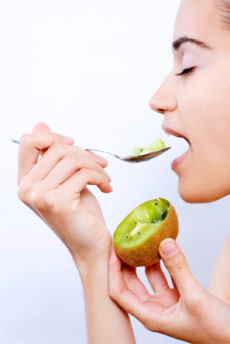|
|
|
 , ,
Font size |
Kiwifruit : Its a Super Fruit

The kiwifruit, often shortened to kiwi in many parts of the world, is the edible
berry of a woody vine in the genus Actinidia.
The most common cultivar group of kiwifruit ('Hayward') is oval, about the size
of a large hen's egg (5�8 centimetres (2.0�3.1 in) in length and 4.5�5.5
centimetres (1.8�2.2 in) in diameter). It has a fibrous, dull greenish-brown
skin and bright green or golden flesh with rows of tiny, black, edible seeds.
The fruit has a soft texture and a sweet but unique flavor, and today is a
commercial crop in several countries, such as New Zealand, Italy, Chile, Greece
and France.
As the local popularity of this fruit increased, New Zealanders discarded the
old Chinese name for the fruit y�ng t�o in favor of the name Chinese Gooseberry.
It was proposed that the fruit be named after the kiwi, New Zealand�s national
symbol, as the bird and the fruit share a similar appearance (small, brown and
furry). "Kiwifruit" was used as a global brand for marketing the fuzzy
kiwifruit, but was not registered internationally as a trademark. Kiwifruit has
since become a common name for all commercially grown fruit from the family
Actinidia.
In Chinese, the current word for most wild or local varieties of the kiwifruit
is the Macaque peach. The imported varieties are often referred to as wonder
fruit (q� y� guo) as q� y� (wonder) sounds similar to kiwi.
The Actinidin found in kiwifruit can be an allergen for some individuals.
Specifically, people allergic to latex, bananas, papayas or pineapples are
likely to also be allergic to kiwifruit. The fruit also contains calcium oxalate
crystals in the form of raphides. Reactions to these chemicals include sweating,
tingling and sore mouth or throat; swelling of the lips, tongue and face; rash;
vomiting and abdominal pain, heartburn; and, in the most severe cases, breathing
difficulties, wheezing and collapse. The most common symptoms are unpleasant
itching and soreness of the mouth, with the most common severe symptom being
wheezing. Severe symptoms are most likely to occur in young children.
Kiwifruit is a rich source of vitamin C (1.5 times the United States DRI per 100
grams) and vitamin K, and a good source of dietary fiber and vitamin E. The
fruit and skin contain flavonoids, actinidin and adhered pollen which may
produce irritation in the mouth and throat of some allergic individuals.
Kiwifruit seed oil contains on average 62% alpha-linolenic acid, an omega-3
fatty acid. Usually a medium size kiwifruit provides about 46 calories, 0.3 g
fat, 1 g protein, 11 g carbohydrates, and 2.6 g dietary fiber found partly in
the edible skin. Kiwifruit is often reported to have mild laxative effects, due
to its significant levels of dietary fiber.
Kiwifruit contains carotenoids, such as provitamin A beta-carotene, lutein and
zeaxanthin.
Kiwifruit components, possibly involving vitamin E and omega-3 fatty acids from
its numerous edible seeds, have potential properties of a natural blood thinner.
A study performed at the University of Oslo in Norway reported that consuming
two to three kiwifruit daily for 28 days significantly reduced platelet
aggregation and blood triglyceride levels (similar to popular mainstream aspirin
therapy), potentially reducing the risk of blood clots.
Nutrient data for Kiwifruit is available at
http://ndb.nal.usda.gov/ndb/foods/show/2271
Health Benefits of Kiwifruit
-
Kiwifruit are the nutrition powerhouse of fruit
 Kiwifruit consistently rank at the top of fruit in nutrition density models,
which tell us exactly how nutritious foods are. That means you get more
vitamins and minerals per gram, and per calorie, of kiwifruit than most
other fruit. Kiwifruit consistently rank at the top of fruit in nutrition density models,
which tell us exactly how nutritious foods are. That means you get more
vitamins and minerals per gram, and per calorie, of kiwifruit than most
other fruit.
-
Kiwifruit are rich in vitamin C
While everyone always thinks of oranges for vitamin C, they should actually
think of kiwifruit - there is twice as much vitamin C in kiwifruit as there
are in oranges! So much, in fact, you only need one kiwifruit each day to
get the amount recommended for your daily intake.
-
Kiwifruit are especially high in other vitamins compared to other
fruit
Vitamin E
It's quite unusual for a low fat food - let alone fruit - to be a good
source of vitamin E, which is well-known for its heart health and
antioxidant properties. However, kiwifruit is a great low-fat, natural
source of vitamin E.
Folic Acid
Kiwifruit are a natural source of folic acid which is needed to prevent
cardiovascular disease, help brain and cognitive development and prevent
neural defects in babies - both before and during pregnancy.
Potassium
Kiwifruit has about the same levels of potassium as bananas but only half
the calories - making kiwifruit an excellent low-sodium, high-potassium
fruit which can be beneficial in the maintenance of blood pressure and for
heart health.
-
Kiwifruit are a good source of the carotenoid lutein
Not only does it have one of the highest concentrations of lutein in fruits
- but the lutein in kiwifruit has recently been shown to be highly
bio-accessible. This means it can actually do good things such as help to
prevent age-related deterioration of eyesight.
Kiwifruit contains an enzyme called Actinidin, which makes it a natural meat
tenderiser. Just cut one in half and rub the fruit over the meat and let it
stand for 10-15 minutes or longer.
-
Kiwifruit are naturally high in antioxidants (e.g. polyphenols,
carotenoids) and other potentially beneficial phytochemicals including some
unique enzymes. Eating kiwifruit helps you to obtain your daily intake of
antioxidants to help fight the damage caused by free radicals and oxidative
stress.
-
Kiwifruit can help improve the function of your immune system
Kiwifruit gives you natural protection from daily challenges, helping you to
ward off the effects of stress, inflammation and attack from bacteria and
viruses. Recent and ongoing trials have shown kiwifruit to be high effective
at beneficially modulating the immune system.
-
Kiwifruit helps improves repair of damaged DNA
Eating just two kiwifruit a day has been proven to reduce the amount of
oxidative damage to your cells and improve the repair of damaged DNA caused
by oxidative stress. This has been shown in human studies both in New
Zealand and Europe.
-
Kiwifruit reduces oxidative stress caused by high-fat meals
Eating kiwifruit with your meal reduces the oxidative stress on your body
caused by the meal - especially if it is high in fat.
Researchers in the United States found that people who ate kiwifruit with or
after a meal had a significant reduction in the markers of oxidative stress.
-
Reduce risk of cardiovascular disease
Eating just 2-3 kiwifruit a day has been shown to reduce blood platelet
aggregation. Platelet aggregation is a known risk factor for cardiovascular
disease - it contributes to arterial and blood vessel blocking.
-
Kiwifruit help to relieve constipation
It is widely
recognised as a natural digestive aid due to its unique combination of fibre
and other components.
Dated 04 March 2013
|
|
|
|
|
|
|









